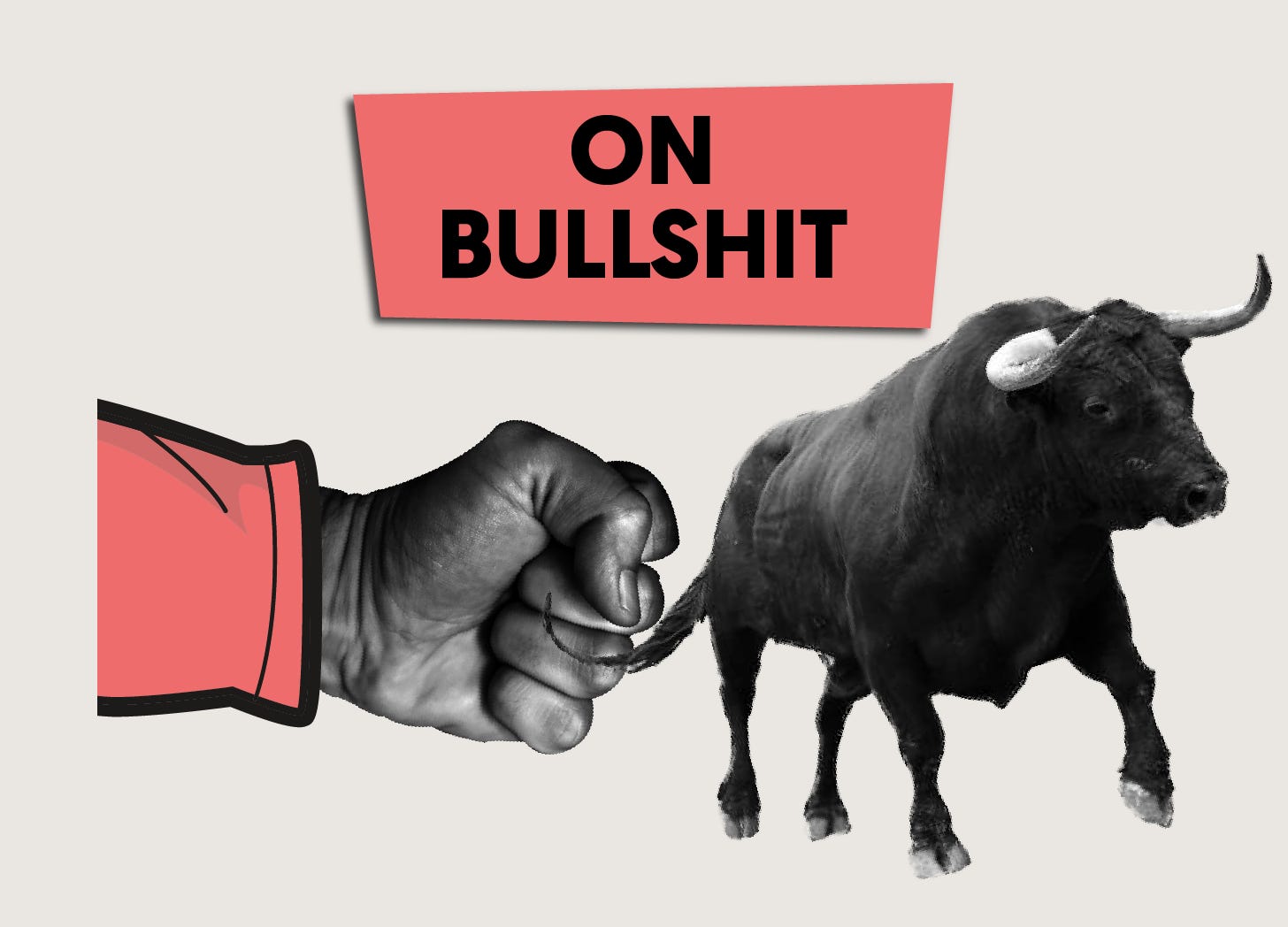On Bullsh*t
Why do I use the word "bullshit" to expose the branding industry?
For anyone new here, I’m the founder of Woo Punch, a brand consultancy rooted in evidence-based brand design. I write about the evidence that debunks brand purpose, differentiation, brand love, loyalty marketing, customer personas, color psychology, mission statements, customer engagement, AdTech, and “hustle culture.”
Want to chat about your brand? Schedule a free intro call
.
WHY I USE THE TERM “BULLSHIT” IN MY WRITING
When I started writing about common myths in marketing, branding, and advertising, I labeled those myths as “lies.” But lies didn’t quite get at the root of what I saw. The word lies assumes that the experts proclaiming these falsehoods were intentionally subverting the truth.
Don’t get me wrong, I’ve had my suspicions about a few famous marketing gurus (*cough* Gary Vee, Seth Godin, Marty Neumeier, Simon Sinek…), but I can’t find any proof they’re liars. Evidence of lying would require intimate knowledge that someone knows the truth, accepts the truth, and still intentionally subverts the truth.
I can come closer to proving that these gurus are bullshitters. What’s the difference? Let’s turn to the foremost expert on bullshit. I’m not bullshitting you. There is an expert on bullshit.
His name is Harry Frankfurt...
HARRY FRANKFURT, BULLSHIT EXPERT
In 2005, Harry Frankfurt was in the spotlight on Comedy Central’s The Daily Show, after his 1985 essay, On bullshit, was re-published into a book the month before. Harry Frankfurt is a Professor Emeritus of Philosophy at Princeton University and was 76 when the episode aired. He looked the part too.
He was slightly hunched over on a couch next to Jon Stewart, wearing a baggy sweater, a button-down shirt underneath, and baggy brown pants. My wife would probably describe him as a “cute old man.”
Whenever Harry uttered the words “bullshit” or “bullshitter,” the audience laughed like little children. An old Ivy League professor cursing on TV was apparently hilarious. On the one hand, Harry Frankfurt seemed to understand the humor of the word, but on the other, he doesn’t take bullshit lightly.
To Frankfurt, bullshit is not a laughing matter. Bullshit is an assault on truth. An assault that, in his mind, is even worse than lying.
LYING IS DIFFERENT THAN BULLSHITTING
In his famous essay, On Bullshit, Harry Frankfurt distinguishes between lying and bullshit. He argues that lying requires someone to know the truth (or at least think they know it) and then intentionally subvert it.
A bullshitter is indifferent to the truth. Bullshitters are only interested in what serves them.
To Frankfurt, liars at least respond to the truth and, in that way, are respectful of the truth. Bullshitters completely disregard it. As a relentless pursuer of truth, Harry Frankfurt genuinely can’t understand why society scolds liars more than bullshitters.
In my discoveries, marketing gurus often disregard the truth in their claims that brands should prioritize customer loyalty for growth, that brands must “differentiate or die,” or that traditional advertising is “dead.”
The studies that debunk these claims are not obscure and are not up for debate by most respected marketing effectiveness researchers. Moreover, some of these studies have been around for decades and replicated in various contexts.
It would be near impossible for these marketing gurus to be unaware of this research if they relentlessly pursued the truth, like Harry Frankfurt. But instead, many have publicly acknowledged the evidence against their claims, written it off, and never provided evidence to the contrary.
This is an assault on truth.
Like Harry Frankfurt, I’m not ok with that. This is why I write about the falsehoods in marketing, branding, and advertising; and call them out for what they are.
Bullshit.




